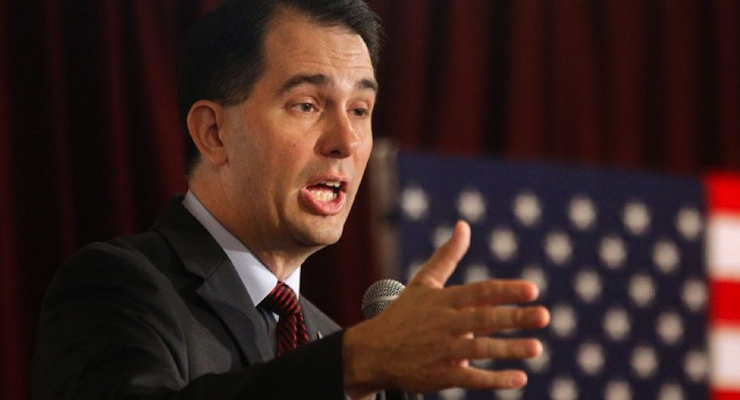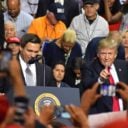
What Happened to Scott Walker?

FILE – In this Sept. 10, 2015 file photo, Republican presidential candidate, Wisconsin Gov. Scott Walker speaks in Eureka, Ill. (AP Photo/Seth Perlman, File)
The top relevant question heading into the CNN Republican debate tonight on Google search is “What happened to Scott Walker?”, behind only “Who is Scott Walker?” The former, for the searchers’ and governor’s sake, I can and am going to answer. While the latter question is one only the governor himself can answer, I am going to give Scott Walker advice before the CNN Republican debate Wednesday night he, no doubt, badly needs but will not get from his team of “advisors.”
If the Wisconsin governor chooses to ignore it, he will do so at his campaign’s peril. Walker, who was the odds-on favorite in the Iowa caucus up until July, gave a performance in the first debate in Ohio that might have seemed sufficient in an average primary election cycle. But Election 2016 has been anything but average. He simply cannot afford to repeat his prior mistakes–or, the candidate who PPD’s election projection model views to be one of the strongest–will sink into permanent irrelevance.
Let’s break this into two different categories–strategy and optics–beginning first with strategy.
In the August debate hosted by Fox News, Walker’s answers were short, not-so sweet and took far less time than is allotted to the candidates outlined in the debate rules. Strategically, you always take the entire time available in a debate because 1) you only have a short time to introduce yourself and convey your message to the viewers/voters and, 2) every second you forfeit is a second you give to your opponent that could potentially result in a break out moment. The governor’s debate prep team was certainly aware of the debate rules, yet were so inept they prepared answers for their candidate that did just that, a la Ben Carson.
Speaking of prepared answers, the governor should just go ahead and throw them in the garbage–like right now. Here is where we inevitably obfuscate strategy and optics, albeit necessarily. The answers in the first debate were canned, resembling more Mitt Romney circa 2012’s second and third presidential debates than Scott Walker circa 2015’s Iowa Freedom Summit. Of all the desired characteristics our focus groups keep telling us they want to see in a candidate this cycle, it is “authentic,” “genuine” and “believable” that we hear over-and-over again.
Scott Walker should be Scott Walker; the Scott Walker who became the first governor ever in American political history to survive a recall election; the Scott Walker who won three elections in four years in a state Republicans haven’t carried since President Ronald Reagan in 1988; and, the Scott Walker who did all this after taking on and defeating big labor in a purple state progressives proudly call “Labor Union’s Historic Birthplace” state.
Finally, on strategy, DO NOT attack Donald Trump, the current and clear frontrunner. Walker’s team, from the beginning, has stubbornly believed criticizing Trump’s controversial statements and positions, all the while trying to one-up him (see building a fence on the Canadian border), is a smart electoral strategy. It isn’t. It’s stupid. In fact, it’s the stupidest thing he could do.
First of all, Walker’s support has been shifting somewhat to Carly Fiorina but mostly to Ben Carson, the latter of which hasn’t exactly surged to second place by attacking The Donald. If Walker or any other candidate wants to end up at the bottom of the barrel, then pull a Sen. Rand Paul or Gov. Bobby Jindal. See how that works out. The smart play would be to attack the media, specifically Jake Tapper, who is planning on pitting Walker and the rest of the candidates against each other tonight.
“What the team and I have been doing is trying to craft questions that, in most cases, pit candidates against the other–specific candidates on the stage–on issues where they disagree, whether it’s policy, or politics, or leadership,” Tapper told Brian Stelter on CNN’s Reliable Sources. “Let’s actually have them discuss and debate.”
The strongest moment for Scott Walker in the first Republican debate was when he said–after an hour of unproductive television–that the candidates had spent too much time attacking each other than directing their fire at Hillary Clinton and Barack Obama. It was the only line that wasn’t canned or disingenuous because it came from Scott Walker, not his team. But, keeping with his team’s overall advice, he backed off too soon and put out his own fire.
Last but not least controversial–and, I am certain this is going to cause myself and my outlet problems–Gov. Walker needs to shake up his campaign if for no other reason than optics.
Fire George Will’s wife–immediately. I don’t know Mari Will or whether she is a wonderful woman. Perhaps she is, but I don’t and Walker shouldn’t care. If anecdotal evidence–as in Donald Trump’s success, or the roaring of the crowd after he rips Will on the stomp–isn’t enough to convince Walker, then let me be as blunt as possible.
GOP primary voters are in no mood to nominate–let alone help elect in a general election–another candidate claiming they will “fight and win” for them, while lining the pockets of the same establishment class they understandably view in such an unfavorable light. It is far more damaging in the minds of GOP primary voters than Walker might realize to have Will compare him to President Ronald Reagan, while disclosing his wife serves in a shadowy “advisor” capacity to the former Iowa frontrunner.
Will, who in 1976 infamously characterized President Reagan’s supporters as consisting “primarily” of “kamikaze conservatives,” now refers to Walker as “a pure Reaganite.” He also referred to establishment favorite Gov. Jeb Bush as a bonafide Reagan conservative. While speaking of Walker’s decline Monday on Special Report with Bret Baier, Will said the campaign’s internal polling shows Walker leading among Iowa caucus-goers who actually braved the cold in 2008 and 2012. In the years I have been analyzing, studying and listening to state and national campaigns, that kind of desperate parsing of polling data has always been the argument coming from the loser.
Now, the question remains: Does Gov. Scott Walker want to win, or lose? Walker, excluding the non-politician candidates, has been the only candidate to hold an early lead in both Iowa and New Hampshire, which is a rare electoral appeal for Republican presidential hopefuls that cannot be understated. Taking the advice above won’t catapult him back in the lead the morning after the debate, but it will get him back on track to again being competitive–even a frontrunner.







